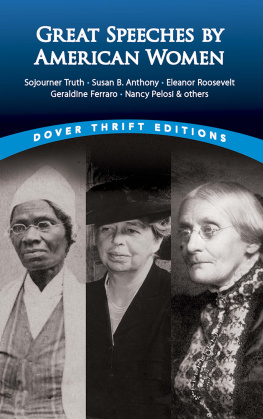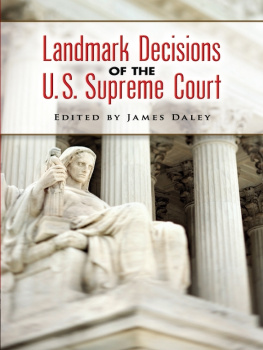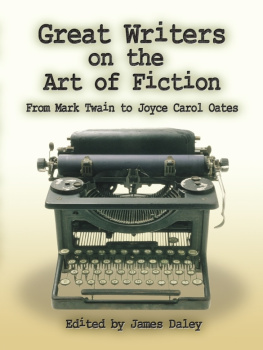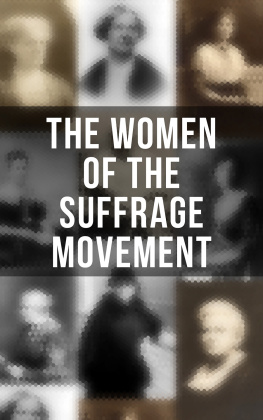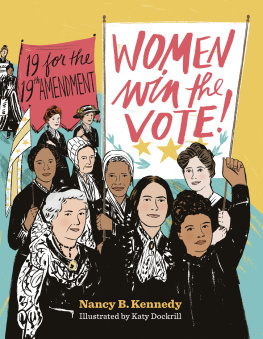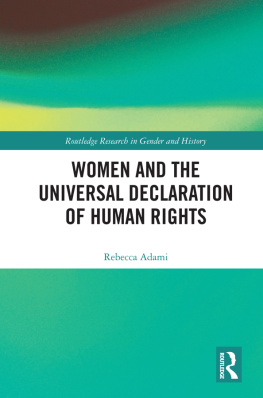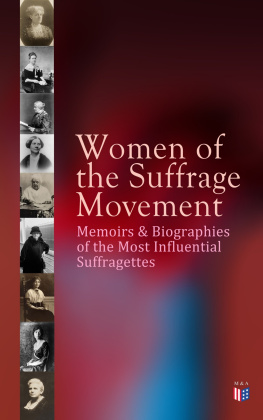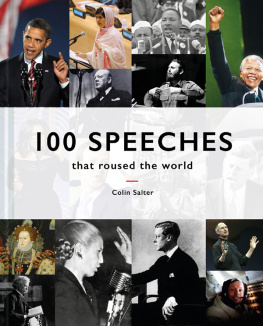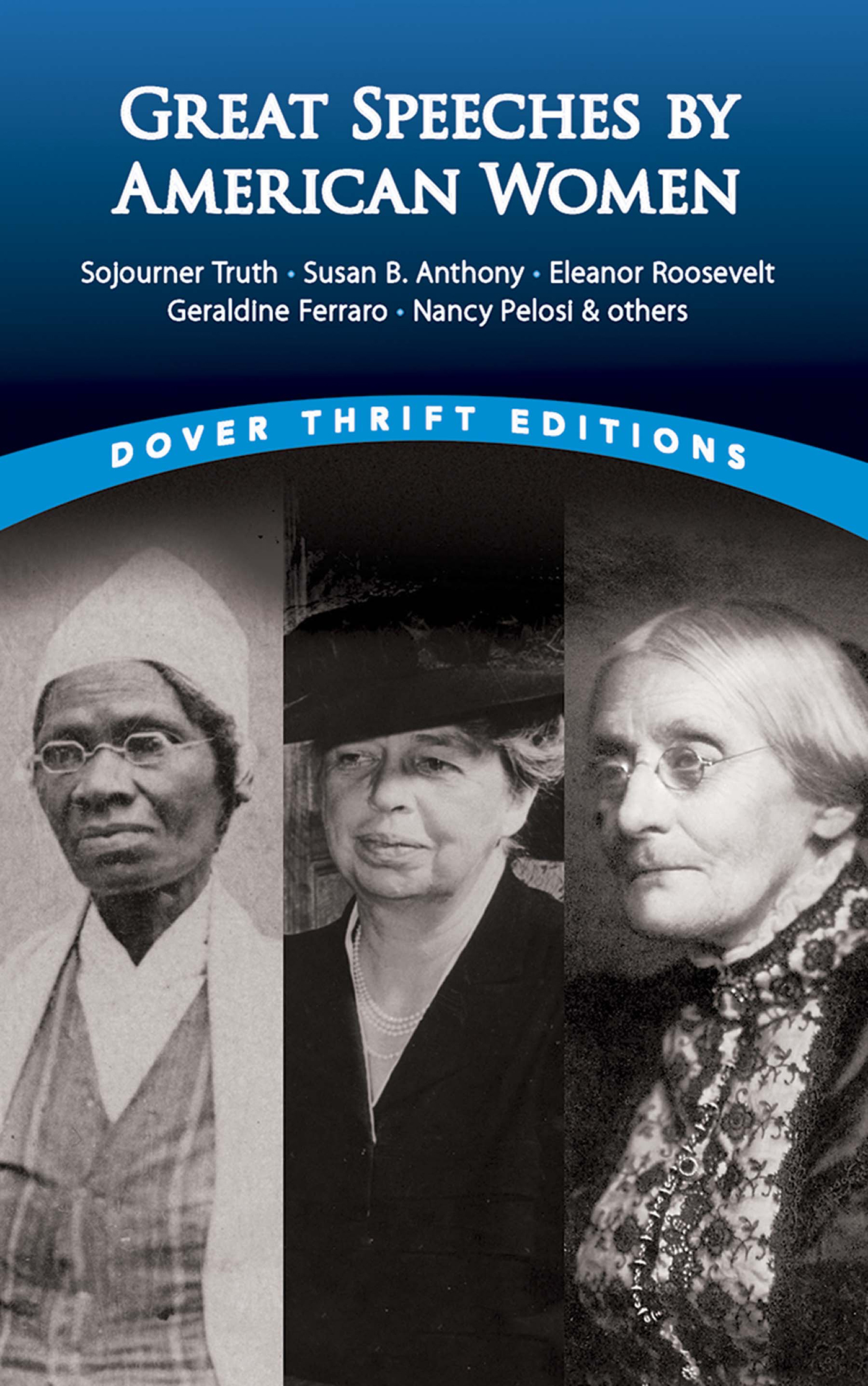A Century of Progress of Negro Women by Mary McLeod Bethune, reprinted with the permission of the Mary McLeod Bethune Foundation, Bethune-Cookman College, Daytona Beach, Florida.
Vice Presidential Nomination Acceptance Address by Geraldine Ferraro, reprinted with the permission of Geraldine Ferraro.
Democratic National Convention Keynote Address by Ann Richards, reprinted with the permission of the Ann Richards Papers, Center for American History, University of Texas at Austin.
A Whisper of AIDS by Mary Fisher, reprinted with the permission of the Mary Fisher Clinical AIDS Research and Education (CARE) Fund.
A 21st Century Feminism by Gloria Steinem, reprinted with the permission of Gloria Steinem.
The New Feminism by Jane Fonda, reprinted with the permission of Jane Fonda.
Sojourner Truth
(17971883)
AINT I A WOMAN?
May 29, 1851
Sojourner Truth, born Isabella Baumfree, was a slave in Ulster County, New York, until gaining her freedom in 1827. In 1843 she took the name Sojourner Truth and began her lauded career as an abolitionist and feminist. The following speech was given by Truth at a womens rights convention in Akron, Ohio. It was offered largely in response to a clergyman who had previously argued that women were too weak and helpless to be given the right to vote.
WELL, CHILDREN, where there is so much racket there must be something out of kilter. I think that twixt the Negroes of the South and the women at the North, all talking about rights, the white men will be in a fix pretty soon. But whats all this here talking about?
That man over there says that women need to be helped into carriages, and lifted over ditches, and to have the best place everywhere. Nobody ever helps me into carriages, or over mud-puddles, or gives me any best place! And aint I a woman? Look at me! Look at my arm! I have ploughed and planted, and gathered into barns, and no man could head me! And aint I a woman? I could work as much and eat as much as a manwhen I could get itand bear the lash as well! And aint I a woman? I have borne thirteen children, and seen most all sold off to slavery, and when I cried out with my mothers grief, none but Jesus heard me! And aint I a woman?
Then they talk about this thing in the head; whats this they call it? [member of audience whispers, intellect] Thats it, honey. Whats that got to do with womens rights or Negroes rights? If my cup wont hold but a pint, and yours holds a quart, wouldnt you be mean not to let me have my little half measure full?
Then that little man in black there, he says women cant have as much rights as men, cause Christ wasnt a woman! Where did your Christ come from? Where did your Christ come from? From God and a woman! Man had nothing to do with Him.
If the first woman God ever made was strong enough to turn the world upside down all alone, these women together ought to be able to turn it back, and get it right side up again! And now they is asking to do it, the men better let them.
Obliged to you for hearing me, and now old Sojourner aint got nothing more to say.
Lucretia Mott
(17931880)
WHY SHOULD NOT WOMAN SEEK TO BE A REFORMER?
October 18, 1854
Lucretia Coffin Mott was an active figure in the nineteenth-century reform movements, but was best known for her work as an abolitionist and suffragette. Along with Elizabeth Cady Stanton, Mott initiated the Seneca Falls Womens Rights Convention in 1848, and in 1850 published Discourse on Women, her famous treatise on the societal restrictions on women in Western Europe and America. The following speech was delivered at the 5th National Womens Rights Convention in Philadelphia on October 18, 1854.
I HAVE NOT come here with a view of answering any particular parts of the lecture alluded to, in order to point out the fallacy of its reasoning. The speaker, however, did not profess to offer anything like argument on that occasion, but rather a sentiment. I have no prepared address to deliver to you, being unaccustomed to speak in that way; but I felt a wish to offer some views for your consideration, though in a desultory manner, which may lead to such reflection and discussion as will present the subject in a true light.
Why should not woman seek to be a reformer? If she is to shrink from being such an iconoclast as shall break the image of mans lower worship, as so long held up to view; if she is to fear to exercise her reason, and her noblest powers, lest she should be thought to attempt to act the man, and not acknowledge his supremacy; if she is to be satisfied with the narrow sphere assigned her by man, nor aspire to a higher, lest she should transcend the bounds of female delicacy; truly it is a mournful prospect for woman. We would admit all the difference, that our great and beneficent Creator has made, in the relation of man and woman, nor would we seek to disturb this relation; but we deny that the present position of woman is her true sphere of usefulness; nor will she attain to this sphere, until the disabilities and disadvantages, religious, civil, and social, which impede her progress, are removed out of her way. These restrictions have enervated her mind and paralyzed her powers. While man assumes that the present is the original state designed for woman, that the existing differences are not arbitrary nor the result of accident, but grounded in nature; she will not make the necessary effort to obtain her just rights, lest it should subject her to the kind of scorn and contemptuous manner in which she has been spoken of.
So far from her ambition leading her to attempt to act the man, she needs all the encouragement she can receive, by the removal of obstacles from her path, in order that she may become the true woman. As it is desirable that man should act a manly and generous part, not mannish, so let woman be urged to exercise a dignified and womanly bearing, not womanish. Let her cultivate all the graces and proper accomplishments of her sex, but let not these degenerate into a kind of effeminacy, in which she is satisfied to be the mere plaything or toy of society, content with her outward adornings, and the flattery and fulsome adulation too often addressed to her.
Did Elizabeth Fry lose any of her feminine qualities by the public walk into which she was called? Having performed the duties of a mother to a large family, feeling that she owed a labor of love to the poor prisoner, she was empowered by Him who sent her forth, to go to kings and crowned heads of the earth, and ask audience of these, and it was granted her. Did she lose the delicacy of woman by her acts? No. Her retiring modesty was characteristic of her to the latest period of her life. It was my privilege to enjoy her society some years ago, and I found all that belonged to the feminine in womanto true nobility, in a refined and purified moral nature. Is Dorothea Dix throwing off her womanly nature and appearance in the course she is pursuing? In finding duties abroad, has any refined man felt that something of beauty has gone forth from her? To use the contemptuous word applied in the lecture alluded to, is she becoming mannish? Is she compromising her womanly dignity in going forth to seek to better the condition of the insane and afflicted? Is not a beautiful mind and a retiring modesty still conspicuous in her?
Indeed, I would ask, if this modesty is not attractive also, when manifested in the other sex? It was strikingly marked in Horace Mann, when presiding over the late National Educational Convention in this city. The retiring modesty of William Ellery Channing was beautiful, as well as of many others who have filled elevated stations in society. These virtues, differing as they may in degree in man and woman, are of the same nature, and call forth our admiration wherever manifested.

